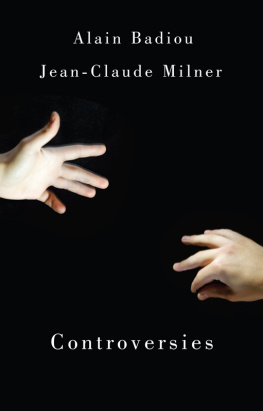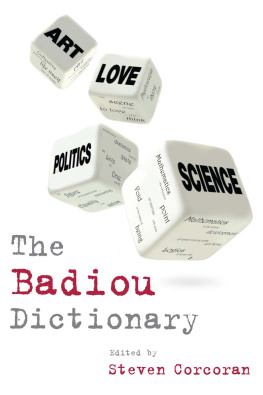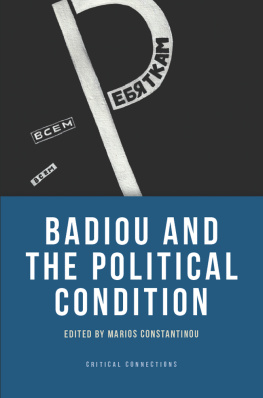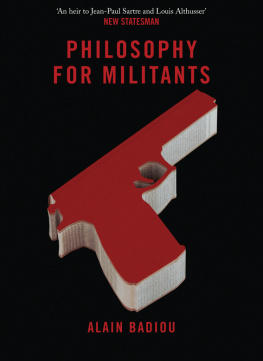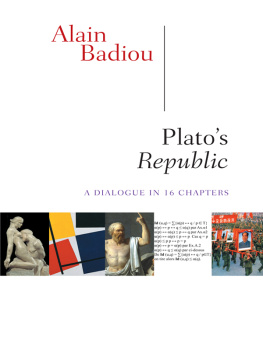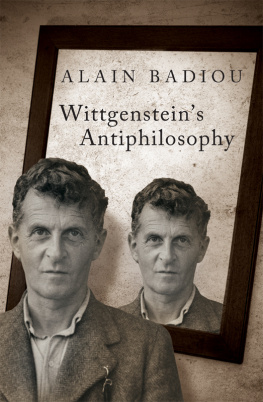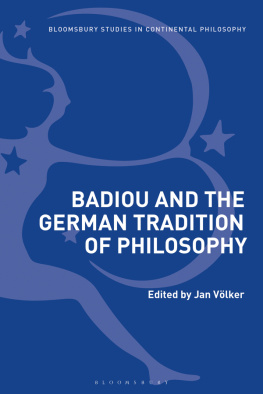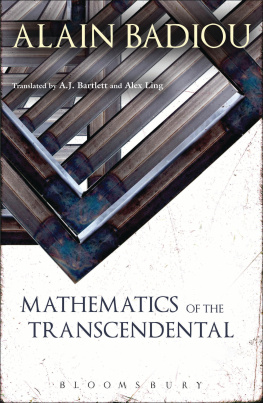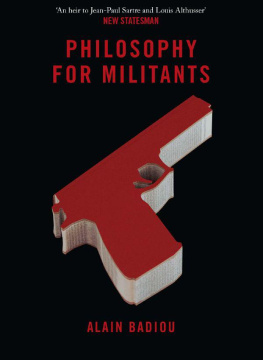Alain Badiou: Live Theory
Also available from Continuum:
Donna Haraway: Live Theory, Joseph Schneider
Fredric Jameson: Live Theory, Ian Buchanan
Gayatri Chakravorty Spivak: Live Theory, Mark Sanders
Hlne Cixous: Live Theory, Ian Blythe and Susan Sellers
Jacques Derrida: Live Theory, James K. A. Smith
Jean Baudrillard: Live Theory, Paul Hegarty
Judith Butler: Live Theory, Vicky Kirby
Julia Kristeva: Live Theory, John Lechte and Maria Margaroni
Slavoj iek: Live Theory, Rex Butler
Alain Badiou: Live Theory
Oliver Feltham

Continuum International Publishing Group
| The Tower Building | 80 Maiden Lane |
| 11 York Road | Suite 704 |
| London SE1 7NX | New York NY 10038 |
www.continuumbooks.com
Oliver Feltham 2008
All rights reserved. No part of this publication may be reproduced or transmitted in any form or by any means, electronic or mechanical, including photocopying, recording, or any information storage or retrieval system, without prior permission in writing from the publishers.
British Library Cataloguing-in-Publication Data
A catalogue record for this book is available from the British Library.
| ISBN-10: | HB: 08264-9692-X |
| PB: 08264-96938 |
| ISBN-13: | HB: 9780-82649692-8 |
| PB: 9780-82649693-5 |
Library of Congress Cataloging-in-Publication Data
A catalog record for this book is available from the Library of Congress.
Acknowledgements
In the research and lead-up to writing this book in the summer and autumn of 2007 it was exchanges with other researchers that helped me find my way out of a dark valley researchers whose own work is continually provoked by that of Badiou: Jason Barker, Bruno Besana, Ray Brassier, Lorenzo Chiesa, Justin Clemens, Elie During, Felix Ensslin, Zachery Lake Fraser, Sigi Jottkandt, Peter Hallward, Dominiek Hoens, Gernot Kamecke, Quentin Meillassoux, Nina Power, David Rabouin, Frank Ruda, Aaron Schuster, Tzuchien Tho and Alberto Toscano. I thank my colleagues and friends at the American University of Paris for their collegiality. Finally I salute my Italian and Australian families and thank them for their support while they passed through their own shadowy valleys in which sunlight was reduced to a thread but a thread that can be followed, as only one knows how: Barbara Formis.
Abbreviations
The following abbreviations for Badious articles and books will be used in the body of the text:
| BE | Being and Event |
| CM | Le concept de modle |
| CT | Court trait dontologie transitoire |
| DI | De lidologie |
| LM | Logiques des mondes |
| MM | Marque et Manque |
| PP | Peut-on penser la politique? |
| RM | Le (Re)commencement de la dialectique matrialiste |
| SI | La subversion infinitesimale |
| TC | Thorie de la contradiction |
| TS | Thorie du sujet |
| TW | Theoretical Writings |
Chapter 1
The Althusserian Years
Epistemology and the Production of Change
Introduction
Le monde va changer de base
The Internationale, French version
It is early May 1968. Alain Badiou, a high-school philosophy teacher in Rouen, is scheduled to give the second part of a lecture in Louis Althussers seminar on philosophy and science at the prestigious cole Normale Suprieure. Its target is the first object of the present chapter.
The following corpus of texts constitutes Badious early work:
Lautonomie du processus historique, Cahiers Marxistes-Lninistes Paris: cole Normale Suprieure, No. 213, juilletoctobre 1966, 7789.
Le (Re)commencement de la dialectique matrialiste, Critique, Tome XXIII, No. 240, mai 1967, 43867.
La subversion infinitesimale, Cahiers pour lanalyse, No. 9, June 1968 (Paris: le Graphe, 1968), 11837.
Marque et Manque, Cahiers pour lanalyse, No. 10, Jan 1969 (Paris: le Graphe, 1969), 15073.
Le concept de modle (Paris: Maspero, 1970).
To complete this list one must add the exoteric texts: a series of documentaries in which Badiou interviewed the leading French philosophers of the day Raymond Aron, Georges Canguilheim, Michel Foucault, Jean Hyppolite, Paul Ricoeur on philoscphys relation to sociology, science, psychology and language. Then one must add the less exoteric interview with Michel Serres, subtitled Concept of Model, the film.
The present text is itself an impossible substitute: billed as a short introduction to Badiou, it introduces the reader to his oeuvre by following his own introduction of his name into the field of philosophy. It begins at the beginning and attempts to briefly first impossibility restitute the initial context of Badious work: Althussers distinction of historical materialism and dialectical materialism, and of science and ideology; and Jacques-Alain Millers critique of Freges foundation of arithmetic. A long introduction would restore the place of Sartre and Bachelard in Badious philosophical ancestry, and reconstruct his complex relation to the dominant intellectual movement of the time, structuralism, not to mention his all too brief naming of respectable adversaries in the persons of Quine and Carnap. But of course and this is the second impossibility there is no such thing as a long introduction; there are monographs, but a monograph is an entirely different animal. To introduce a philosophy is to open a door onto it as quickly as possible. If the reader doesnt simultaneously start reading Being and Event, or learning French to read Badious as yet untranslated works, then this introduction has not been quick enough.
But one cannot write an introduction to a philosophers work third impossibility without interpreting that work. To periodize Badious oeuvre, to identify the projects specific to each period, to evaluate their fate, to map his separation from his masters, Althusser and Lacan, to posit the existence of an underlying problematic that unites the different periods: all of this is to interpret Badiou, to select and divide, choose and exclude particular philosophical themes. The interpretation I develop here proceeds via a comparative analysis of each period of his oeuvre: the early period of materialist epistemology, the Maoist period of the historical dialectic, the current period of philosophy and its conditions. The guiding thread for this analysis is the question of the relationship between the thought of multiplicity and the thought of change. However, in so far as this book is primarily an introduction to Badiou fourth impossibility it cannot satisfactorily fulfil the tasks of interpretation: this would require the systematization of my own concepts, concepts I begin to sketch in .
In this chapter, I identify Badious initial projects and explain how he disengages his own trajectory from the work of his master, Althusser. The second chapter reconstructs Badious Maoist period. The third chapter attempts to define a third period beginning with the text Peut-on penser la politique, centred on Being and Event, and continuing to the present day.
To return to the target of Badious first philosophical text, Le concept de modle
Next page

